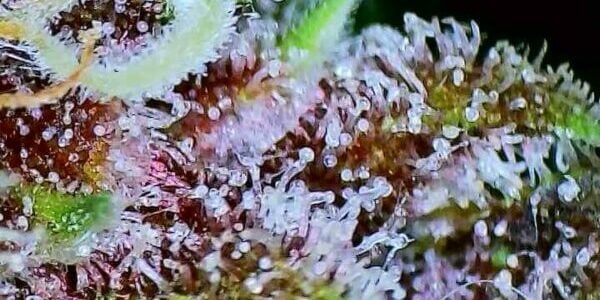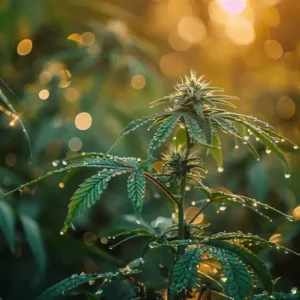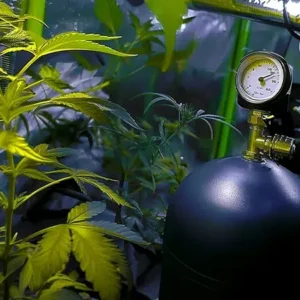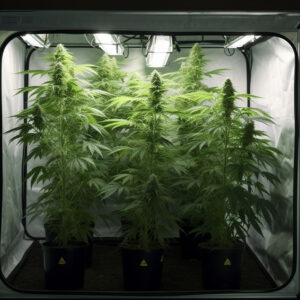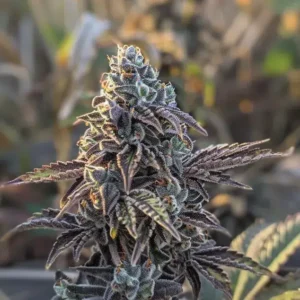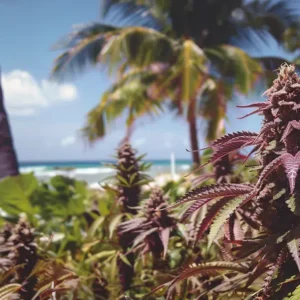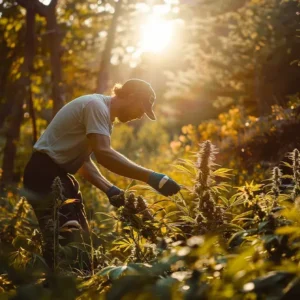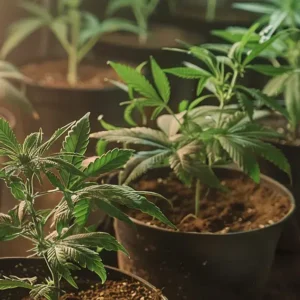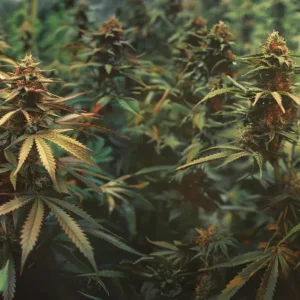Weed comes in a variety of flavors and aromas. When growing your own, it’s natural to want those tastes and smells to come out.
To do that, you’ll need to know how to increase the trichomes in your plants. They’re responsible for the flavor, fragrance, and experience you get from weed.
What are trichomes?
The tiny, sticky, white ‘hairs’ that grow on the surfaces of leaves, buds, and stems of cannabis are trichomes.
And although they’re misleading at times, trichomes are an indication of a healthy and potent plant.


Why? Trichomes increase in response to environmental conditions. The trichomes on cannabis increase in number to insulate the plant and help reduce evaporation by protecting the cannabis from wind and heat.
Increased trichome production can also be a sign of physical stress as it’s a line of defense that’s supposed to deter predators with a pungent aroma and powerful taste from the terpenes.
This fact is why many growing techniques involve cutting cannabis (e.g., topping, monster cropping, mainlining). These techniques simulate an attack from pests.
Download my free Grow Bible to learn more about trichomes and other ways to know if your cannabis plants are thriving well.
The trichomes in cannabis are glandular. That means there’s a bulb at the tip of each trichome.
These dew-shaped bulbs contain the terpenes and cannabinoids of the plant, and they break when touched. That’s why you should avoid touching the plant as much as possible.
The best ways to boost trichome production on weed plants
Choose the right genetics
Before cultivating cannabis at home, select a strain with high concentrations of trichomes, such as White Widow, G13, or OG Kush.
Then, select the best plants. Every cannabis plant is unique, and you’re sure to find that some products better than others.
Once you’ve identified the plant with the best characteristics for trichome production, breed it further. You’ll end up with plants that produce high concentrations of trichomes.
If you’re wondering how to increase trichome and terpene production in cannabis, this is it.
And although this approach requires a lot of time and effort, the benefits are undeniable. Of course, you’ll need to know how to clone your cannabis; however, I explain that here.
You’ll simply need to focus on finding a stable mother for your cuttings.
Proper lighting
If you have an indoor setup, the easiest way to obtain concentrations of trichomes is by setting up LED grow lights.
Although they’re quite expensive, more so than HIDs, they at least provide a fuller spectrum of light.
LEDs provide your plants with UVB rays which increase trichome production in your plants in response to what your plant considers an attack.
You can easily increase trichome levels by 32%. LEDs are your best source of indoor UVB light.


However, HIDs aren’t a bad alternative if you find LEDs a little too pricey.
With the ballasts and reflectors, you can use HIDs for larger cannabis gardens, and surprisingly they don’t consume as much power as you’d think.
The major drawback is that they take a bit of time to reach their max output of light, and they produce heat which can be good if you need to increase the temperature.
HIDs come in two options; Metal Halide (MH), which is good for cannabis in their vegetative phase, and High-Pressure Sodium (HPS).
If you’re wondering how to increase trichome production during flowering with HIDs, choose HPS lights.
Plant nutrition
Naturally, the nutrients you give to your cannabis play an essential role in trichome production.
Whether you’re growing in pots, the earth, or hydroponically, it’s a good idea to check the nutrients in your growing medium regularly.
That way, you know if you’re giving your plants the nutrition they need to grow properly.
Give your cannabis plants all the nutrients they need from seedling to harvest with our Marijuana Fertilizer set. Grab yours today!


Buy marijuana fertilizer
- Nutrients from seedling to harvest
- Maximize your yield
- Enough nutrients for at least 5 plants
- Discounted combination deal
Remember, increased trichome production is an indication of a healthy and potent cannabis plant.
However, it can be misleading if poor genetics are the cause of its low trichome concentrations.
But generally speaking, low trichome concentrations indicate a nutrient deficiency. To avoid that, pay attention to what you give your plants.
This usually means following a nutrient schedule. As a rule of thumb, your cannabis plants need phosphorus and potassium during their flowering stage, as it helps with the development of flowers and their oils.
Adequate watering
And speaking of nutrition, the most essential nutrient is water. How you water your cannabis plants depends on the growing medium you choose.
In the case of soil, water the plants when the topsoil feels dry. For coco coir, you will need to water the plants every 1-2 days.
Be sure to adjust the water intake depending on the moisture content of the growing mix.


Interestingly, a study published by the American Society for Horticultural Science showed that the application of drought could increase the number of cannabinoids in cannabis during their flowering period.
That’s why inducing hydric stress is our answer to the question of how to increase trichome production before harvest.
Although it did not specifically indicate anything about increased trichome production, it’s still a technique that can boost THC levels up to 50%. It’s safe to assume that there will also be some extra trichome growth.
Temperature and humidity
Another key factor for cultivating cannabis plants rich with cannabinoids and terpenes in their trichomes is temperature and humidity.
Even if the strain you’re growing is predisposed to have heavy trichome production, the trichomes in the plant will have subpar quality unless it’s given the ideal growing conditions.
This is why environmental factors such as humidity and temperature are key for cannabis cultivation, especially during their flowering period.
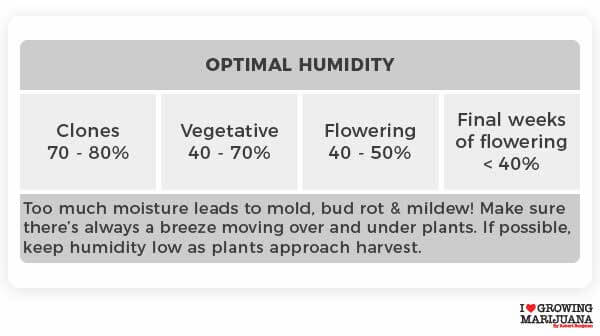

When the temperature and humidity levels are not ideal in the last two weeks of flowering, your cannabis will suffer, and this could lead to a poorer quality harvest.
However, under the right conditions, your cannabis will not only grow but also have a high chance of increased trichome production.
Also read “Humidity and marijuana plants“
This is the better alternative to the question of how to increase trichome production during flowering. I mean, do you really want to starve your plants?
To increase trichome production using this method, gradually reduce the temperature at night to as low as 15°-16°C while keeping the daytime temperature under 25°C. As for humidity, it should stay at a relative 35-40%.
Planning your harvest accordingly
In practice, harvesting cannabis requires a good eye and a lot of patience.
Even if you set up the perfect conditions for your plants, your efforts are wasted if you harvest way too early. Once your cannabis garden is ready to harvest, wait for it to ‘ripen’ sort of speak.
What’s going on while you wait? Here are the four stages of trichome development in marijuana.


- Stage 1: The trichomes are clear and thin, which means they aren’t as potent as you would like – leading to ‘speedy’ effects, or worse, headaches. Do not harvest at this stage. Your yields will be much lower because cannabis buds put on a lot more bulk during the last 2-3 weeks.
- Stage 2: If you’re growing marijuana for the mental effects, harvest in the 2nd stage. During this time, the trichomes begin to turn white and milky, increasing the levels of THC and psychoactive effects.
- Stage 3: For full-body relaxation, harvest during the 3rd stage. You’ll see most of the white trichomes turn amber/yellow. The color change indicates that the THC is starting to convert to a different cannabinoid.
- Stage 4: If you want your smokable harvest to help with sleep, harvest in the 4th stage, just before the buds start to wither and die. Most people prefer to harvest at stage 3, but waiting can produce interesting effects for those seeking a truly psychedelic effect.
Learn more about timing your harvest with our free mini harvesting guide.
Key takeaways
Looking for a summary? The most important thing to get from this article is this: trichomes are sites for cannabinoids and terpenes.
They are responsible for the psychoactive effects of marijuana as well as its taste and fragrance.
Plenty of trichomes indicate a healthy cannabis garden, which is yet another reason why you’d like to have more of them.
For the best results, you need to start with the best seeds! Shop my store for high-quality marijuana seeds.


Buy marijuana seeds
- We ship daily to all U.S. states for FREE!
- Our seeds are guaranteed to germinate
- Feminized seeds for guaranteed bud
- Consistent heavy yields
- Get 24/7 grow support
FAQs about increasing marijuana trichomes on cannabis
What nutrients can help boost trichome production?
Low trichome levels indicate a nutrient deficiency. To avoid that, pay attention to what you give your plants. As a rule of thumb, your cannabis plants need phosphorus and potassium during their flowering stage, as it helps with the development of flowers and their oils.
What do trichomes look like when my cannabis plants are ready to harvest?
If you’re looking for full-body relaxation, harvest when you see most of the white trichomes turn amber/yellow.
Want to grow marijuana like a pro? You only need practice and learning. Get started by reading my blog.
Do you have more tips on increasing trichome levels on your weed plants? Please feel free to share them in the comments!
Happy growing!
Robert
